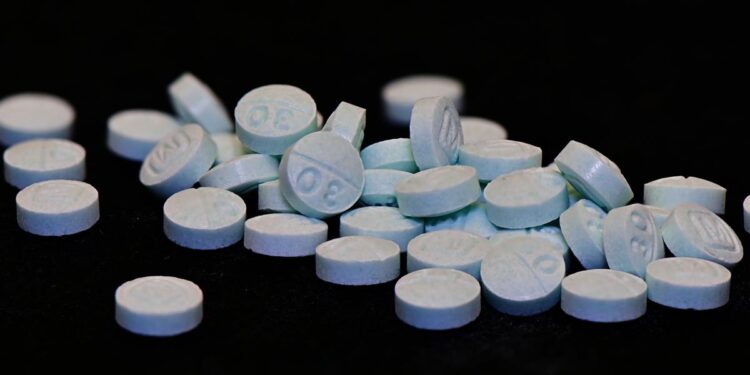Federal and local law enforcement seized more than 50,000 counterfeit pills containing carfentanil, a synthetic opioid 100 times more potent than fentanyl, during a September 16 operation in Centralia following a months-long investigation.
The Drug Enforcement Administration, Alcohol Tobacco and Firearms, Federal Way Police, and Centralia Police collaborated on the investigation that led to the seizure of 50,208 pills after a K-9 unit alerted to narcotics in a vehicle at a gas station.
A driver from Pacific, Washington, was arrested and faces federal charges in connection with the drug seizure. Laboratory testing at the DEA Western Laboratory in Pleasanton, California, confirmed the pills contained carfentanil and acetaminophen rather than fentanyl commonly found in counterfeit medications.
Carfentanil was originally developed for veterinary use to tranquilize large animals like elephants and is estimated to be 10,000 times more potent than morphine. The synthetic opioid is not approved for human use, with microscopic amounts potentially fatal to humans.
The seizure reflects the evolving nature of the opioid crisis, with synthetic opioids accounting for nearly 70% of drug poisoning and overdose deaths in 2023. Carfentanil represents one of the deadliest fentanyl analogues currently circulating.
Centers for Disease Control and Prevention data shows carfentanil-related deaths increased dramatically from 29 cases between January and June 2023 to 238 during the same period in 2024. The drug has been detected in 37 states nationwide.
King County Medical Examiner’s Office reported six carfentanil-related overdoses in 2024 and four so far in 2025, indicating the substance’s presence in the local drug supply.
The DEA noted that most 2024 carfentanil seizures involved pill or tablet forms rather than typical powder, increasing risks due to their deceptive appearance resembling legitimate prescription medications.
Carfentanil exposure symptoms include respiratory depression or arrest, drowsiness, disorientation, sedation, pinpoint pupils, and clammy skin, which can appear within minutes of contact. Treating carfentanil overdoses presents significant challenges, as standard naloxone treatment may require multiple high doses and is not guaranteed effective.
The seizure highlights the increasing sophistication of counterfeit pill manufacturing, with dangerous substances being pressed into forms that closely mimic legitimate prescription painkillers.
Law enforcement officials emphasize the critical danger posed by counterfeit medications, as users cannot distinguish between pills containing different substances or potency levels by appearance alone.
The DEA continues warning the public with its “One Pill Can Kill” message, advising people to never take pills not prescribed by doctors and dispensed by licensed pharmacists.
In suspected overdose situations, officials recommend immediately calling 911 and administering naloxone if available, though multiple doses may be necessary for carfentanil exposure.
The case demonstrates ongoing challenges in combating synthetic opioid trafficking as drug manufacturers develop increasingly potent and dangerous substances that pose escalating public health threats.







